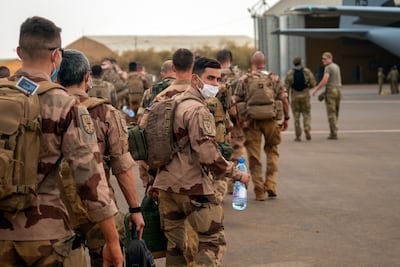France will reduce its forces fighting terrorism in the Sahel by almost half despite the continued extremist threat, President Emmanuel Macron announced on Friday.
More than 2,000 French troops will be withdrawn and soldiers will begin closing their bases in northern Mali before the end of the year.
The withdrawal comes as US, British and other Nato allies depart from Afghanistan, leaving it increasingly vulnerable to a Taliban takeover.
The Sahel region of West Africa is in a similarly fragile state, but with no apparent end in sight to its operations and regional political turmoil, especially in Mali, Paris has grown frustrated.
“We will remain committed, but to remain committed is also to adapt,” Mr Macron told a news conference after a virtual summit with leaders from the Sahel region.

Mr Macron announced a month ago that France was ending its Operation Barkhane mission eight years after it first intervened in the Sahel and would operate within a broader international alliance.
The French president said this was made possible by the changing nature of the threat as well as the capabilities of local armies and support from other European nations.
“This reconfiguration will begin in the coming weeks. In line with the shift in threat to the south, it will mean a reduction in our military footprint primarily in the north,” he said.
France will be left with around 2,500 troops in the Sahel once the drawdown was completed by early 2022, Mr Macron said.
It is understood that French commandos in the “Sabre” task force will remain to hunt down the leaders of extremist groups linked to Al Qaeda or ISIS.
Niger’s President Mohamed Bazoum told the news conference he supported the French troop reduction.
Mr Macron hopes that he can convince EU allies to step up their presence, but the withdrawal opens an uncertain phase in the fight against insurgents that control large parts of West Africa.
Fresh political upheaval in Mali and Chad, where juntas are now in charge, raises further questions about whether local governments can effectively tackle the Islamist threat.
The French president has previously warned that military force “cannot be a substitute for political stability".
He has pressed Sahel leaders to win public support by stamping out corruption in their impoverished states, and by restoring government control and services in areas where Islamist fighters have closed schools and driven tens of thousands from their homes.
France has also struggled to train local troops grouped in a Sahel anti-extremist alliance that remains outmatched in many areas by fighters who have staged increasingly bold attacks in recent months.
Paris now plans to fold its presence into the so-called Takuba international task force, originally a training operation for Mali. The force currently comprises about 600 soldiers, half of them French.
So far, the Czech Republic, Estonia, Italy and Sweden have answered Mr Macron's calls for contributions to help make Takuba function more as a counter-terrorism mission.
Even if bigger allies like Germany sent hundreds of soldiers, winning the fight against insurgents spread across a semi-desert area the size of Western Europe will not be easy.
“For many European governments, the current extent of their military involvement in the Sahel already pushes up against political red lines at home,” said Andrew Lebovich, a researcher at the European Council on Foreign Relations.

